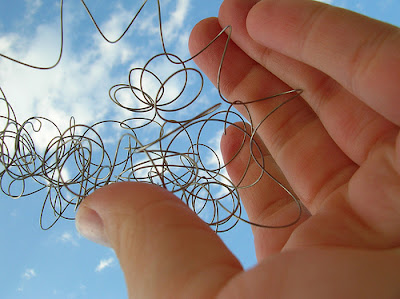Jen Ballantyne and the Doctrine of Substituted Love
 Tuesday, February 19, 2008 at 4:37PM
Tuesday, February 19, 2008 at 4:37PM Two nights ago I dreamt that I got a letter from my doctor informing me that I had leukemia and that my prognosis was poor. I tried to wrap my dream-mind around the fact that I was probably going to die soon. I woke with a heavy sadness that stayed with me all day.
Underneath that sadness is another burden I've been meaning to tell you about. Jen Ballantyne, an amazing woman in Australia, is battling bowel cancer. She has been told that she has 12-18 months to live. At age 39 and with two sons, she's not ready to go. Jen has been breathtakingly honest about this journey on her blog, The Comfy Place. Thanks to the efforts of several other amazing bloggers (including Meg, Jen, and Jena), a host of lovely women have gathered around Jen to lift her up. I invite you to do the same.
I've never met Jen in person, have only recently started to read her blog, but think about her multiple times during the day. I fervently want to see her made whole, with no more pain and plenty of good years ahead of her. I wish this so strongly that I feel like she's one of my kin. That naturally leads to thoughts of how we're all connected, how our lives and stories are intertwined beyond what we can see or explain. I don't mean to sound presumptuous, but I feel like I'm carrying around part of Jen's fear, sadness, and pain. In fact, it feels like dozens of people from around the world are carrying her burden.
In his novel Descent into Hell, Charles Williams puts forth his doctrine of substituted love. He claims that we can carry another person's burden, not in a metaphorical sense, but in a real way. He says that I can choose to take on someone else's fear, carrying it as my own, and freeing the other person from it. The other person no longer has to be afraid, because I'm doing that for her. I experience the fear firsthand, but can handle it just fine because it is not my own.
Here's an excerpt from the book. In it, Pauline is terrified of meeting her doppelganger -- her exact double -- face to face. The poet Peter Stanhope tells her that he'll carry her fear for her, so that she doesn't have to be afraid. (I've included a long excerpt. Williams' writing style is rather dense and takes some getting used to. But I hope you'll stick with it to get the full impression of what he's talking about.)
"It's me," she repeated." It comes from a long way off, and it comes up towards me, and I'm terrified--terrified--one day it'll come on and meet me. It hasn't so far; it's turned away or disappeared. But it won't always; it'll come right up to me--and then I shall go mad or die."
"Why?" he asked quickly, and she answered at once, "Because I'm afraid. Dreadfully afraid."
"But," he said, "that I don't quite understand. You have friends; haven't you asked one of them to carry your fear?"
"Carry my fear!" she said, sitting rigid in her chair, so that her arms, which had lain so lightly, pressed now into the basket-work and her long firm hands gripped it as if they strangled her own heart. "How can anyone else carry my fear? Can anyone else see it and have to meet it?"
Still, in that public place, leaning back easily as if they talked of casual things, he said, "You're mixing up two things. Think a moment, and you'll see. The meeting it -- that's one thing, and we can leave it till you're rid of the other. It's the fear we're talking about. Has no one ever relieved you of that? Haven't you ever asked them to?"
She said "You haven't understood, of course.... I was a fool.... Let's forget it."
....."Will you tell me whether you've any notion of what I'm talking about? And if not, will you let me do it for you?"
She attended reluctantly, as if to attend were an unhappy duty she owed him, as she had owed others to others and tried to fulfill them. She said politely, "Do it for me?"
"It can be done, you know," he went on. "It's surprisingly simple. And if there's no one else you care to ask, why not use me? I'm here at your disposal, and we could so easily settle it that way. Then you needn't fear it, at least, and then again for the meeting--that might be a very different business if you weren't distressed."
"But how can I not be afraid?" she asked. "It's hellish nonsense to talk like that. I suppose that's rude, but--"
"It's no more nonsense than your own story," he said. "That isn't; very well, this isn't. We all know what fear and trouble are. Very well--when you leave here you'll think of yourself that I've taken this particular trouble over instead of you. You'd do as much for me if I needed it, or for any one. And I will give myself to it. I'll think of what comes to you, and imagine it, and know it, and be afraid of it. And then, you see, you won't."
She looked at him as if she were beginning to understand that at any rate he thought he was talking about a reality, and as she did so something of her feeling for him returned. It was, after all, Peter Stanhope who was talking to her like this. Peter Stanhope was a great poet. Were great poets liars? No. But they might be mistaken. Yes; so might she. She said, very doubtfully: "But I don't understand. It isn't your--you haven't seen it. How can you--"
....
"Listen--when you go from here, when you're alone, when you think you'll be afraid, let me put myself in your place, and be afraid instead of you." He sat up and leaned towards her.
"It's so easy," he went on, "easy for both of us. It needs only the act. For what can be simpler than for you to think to yourself that since I am there to be troubled instead of you, therefore you needn't be troubled? And what can be easier than for me to carry a little while a burden that isn't mine?"
She said, still perplexed at a strange language: "But how can I cease to be troubled? will it leave off coming because I pretend it wants you? Is it your resemblance that hurries up the street?"
"It is not," he said, "and you shall not pretend at all. The thing itself you may one day meet--never mind that now, but you'll be free from all distress because that you can pass on to me. Haven't you heard it said that we ought to bear one another's burdens?"
"But that means--" she began, and stopped.
"I know," Stanhope said. "It means listening sympathetically, and thinking unselfishly, and being anxious about, and so on. Well, I don't say a word against all that; no doubt it helps. But I think when Christ or St. Paul, or whoever said bear, or whatever he Aramaically said instead of bear, he meant something much more like carrying a parcel instead of someone else. To bear a burden is precisely to carry it instead of. If you're still carrying yours, I'm not carrying it for you--however sympathetic I may be. And anyhow there's no need to introduce Christ, unless you wish. It's a fact of experience. If you give a weight to me, you can't be carrying it yourself; all I'm asking you to do is to notice that blazing truth. It doesn't sound very
difficult.""And if I could," she said. "If I could do--whatever it is you mean, would I? Would I push my burden on to anybody else?"
"Not if you insist on making a universe for yourself," he answered. "If you want to disobey and refuse the laws that are common to us all, if you want to live in pride and division and anger, you can. But if you will be part of the best of us, and live and laugh and be ashamed with us, then you must be content to be helped. You must give your burden up to someone else, and you must carry someone else's burden. I haven't made the universe and it isn't my fault. But I'm sure that this is a law of the universe, and not to give up your parcel is as much to rebel as not to carry another's. You'll find it quite easy if you let yourself do it."
"And what of my self-respect?" she said.
He laughed at her with a tender mockery. "O, if we are of that kind!" he exclaimed. "If you want to respect yourself, if to respect yourself you must go clean against the nature of things, if you must refuse the Omnipotence in order to respect yourself, though why you should want so extremely to respect yourself is more than I can guess, why, go on and respect. Must I apologize for suggesting anything else?"
He mocked her and was silent; for a while she stared back, still irresolute. He held her; presently he held her at command. A long silence had gone by before he spoke again.
"When you are alone," he said, "remember that I am afraid instead of you, and that I have taken over every kind of worry. Think merely that; say to yourself--'he is being worried,' and go on. Remember it is mine. If you do not see it, well; if you do, you will not be afraid. And since you are not afraid. . . ."
She stood up. "I can't imagine not being afraid," she said.
"But you will not be," he answered, also rising, certainty in his voice, "because you will leave all that to me. Will you please me by remembering that absolutely?"
"I am to remember," she said, and almost broke into a little trembling laugh, "that you are being worried and terrified instead of me?"
"That I have taken it all over," he said, "so there is nothing left for you."
"And if I see it after all?" she asked.
"But not 'after all'," he said. "The fact remains--but see how different a fact, if it can't be dreaded! As of course it can't--by you. Go now, if you choose, and keep it in your mind till--shall I see you to-morrow? Or ring me up to-night, say about nine, and tell me you are being obedient to the whole fixed nature of things."
"I'll ring up," she said. "But I ... it sounds so silly."
"It is silly sooth," he answered, "and dallies with the innocence of love. Real sooth, real innocence, real love. Go with God."
They shook hands, and slowly, looking back once, just before she reached the lane, she went out of his sight.
(pp. 96-100. Williams, Charles. Descent into Hell. Grand Rapids: William B. Eerdmans Publishing Company, 1993.)
My friend Allyson and I tried this out once when she had a piano recital. I told her that I'd take her stage fright so she could play unhindered. As soon as she sat down at the piano my stomach turned upside down and inside out with nervousness. Sitting there in the audience, I had a full-blown case of stage fright. And yet, it wasn't overwhelming or unmanageable. I felt the fear completely, and yet it didn't belong to me. That small but significant difference made it fine, made it bearable.
Allyson played the Chopin Nocturne beautifully. Afterward, she said that her fear melted away as soon as she sat down.
An informal piano recital is one thing. Dealing with a life-threatening illness is another. But I believe we can do more than simply sympathize with Jen Ballantyne's burden. I believe we can can collectively carry it for her, taking away the fear so that she can continue on this journey unafraid. It sounds grandiose, crazy, and a little bit naive. But I believe it's already started to happen as strangers take Jen into their hearts and support her in unfathomable ways.
 beautiful things,
beautiful things,  community,
community,  inspiration,
inspiration,  jen ballantyne,
jen ballantyne,  life,
life,  love,
love,  religion
religion 





